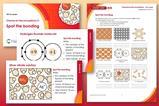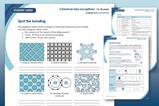The notion of ‘scaffolding’ learning is discussed - that is, providing support that is gradually reduced as the learner masters the material
Some students always seem to want to be ‘told the answers’ and some seem to think it is the teacher’s job to simply provide information.
The problem of the optimal level of difficulty
Most teachers are familiar with the problem of deciding how difficult to make work that is set for learners.
Copying information from the board is often an ’activity’ that implies that students are not actively learning, but this is not always the case. Good teachers can involve students in skilful expositions of a difficult concept area, with a certain amount of incidental copying (note-taking) along the way. However, it is generally recognised that most students do not actively process information when the task set is primarily of a copying nature.
Seeing chemistry at a different resolution
The teacher can specify the concepts upon which the new learning depends, and ensure learners have these ideas available before proceeding. This is important, but may not be sufficient to ensure learners follow the teaching.
It is not enough to check the right background is available, the teacher also has to ensure that the exposition provided, and tasks set, do not overload the learners’ working space. This means that the teacher has to learn to perceive the conceptual structure at the resolution available to the learners.
Building needs foundations and scaffolding
Although the notion of ’constructing’ knowledge may seem to be just a metaphor, the analogy between constructing a building and building an understanding of a subject, such as chemistry, is a useful one.
Just as a building needs firm foundations, so does learning. When the necessary pre-requisite knowledge is missing the structure can not be built (a null learning block), or at least does not match the architect’s plans (a substantial learning block).
In practice, scaffolding is erected as a temporary source of support, until the building can progress to the stage where the scaffolding is no longer needed.
Knowledge construction can be seen to be closely analogous. Although one might imagine that a subject should be logically structured so that it can be built up brick by brick, many subjects can not be learnt in such a straightforward way.
Chemistry is a subject built upon models which are often mutually supporting. Chemists invent conceptual entities to help make sense of their data, and each new concept (acid, element, oxidation, orbital, hybridisation) opens up new investigations which allow a finer grade understanding of the behaviour of chemical substances - and allow us to refine and redefine the theoretical entities themselves.
Scaffolding learning (1): trust me I’m a teacher
It seems then that teaching a complex subject such as chemistry requires the teacher to do more that just present the material clearly and in a logical order. The teacher must also help the learner by supporting them when the working space is insufficient to hold all the relevant factors in mind at once.
Scaffolding learning (2): being in the zone
This idea brings us back to the common teachers’ dilemma of how hard to make a task. Make a task too easy and it is boring and does not bring about learning. A task that is too difficult will not be achieved, is de-motivating, and does not bring about learning either. The teacher needs to get the students working ’in the zone’, and to provide the support that enables them to develop.
Scaffolding learning (3): what does scaffolding mean in practice?
In practice, teachers have to be able to set tasks that students are not yet able to succeed in when totally unsupported. The teacher then provides the support, which is gradually reduced as the learner is able to master the ideas, until no support is needed. At this point the learner is able to mentally chunk material so that tasks that were too involved and overwhelmed their mental ’working space‘, are now perceived as having fewer separate components.
Notes
For the full version of this chapter, see downloads below.
Downloads
Scaffolding learning
PDF, Size 1.16 mb
Websites
Additional information
These PDFs have been taken from the popular book, Chemical Misconceptions : Prevention, diagnosis and care: Theoretical background, Volume 1, by Keith Taber.

Chemical misconceptions

Discover classroom strategies and activities to tackle common misconceptions among students in chemistry, and explore the theory behind different approaches.
- 1
- 2
- 3
- 4
- 5
- 6
 Currently
reading
Currently
reading
Scaffolding learning in chemistry
- 8
- 9
- 10
- 11
- 12
- 13
- 14
- 15
- 16
- 17
- 18
- 19
- 20
- 21
- 22
- 23
- 24
- 25
- 26
- 27
- 28
- 29
- 30
- 31
- 32
- 33
- 34
- 35
- 36





























































































No comments yet